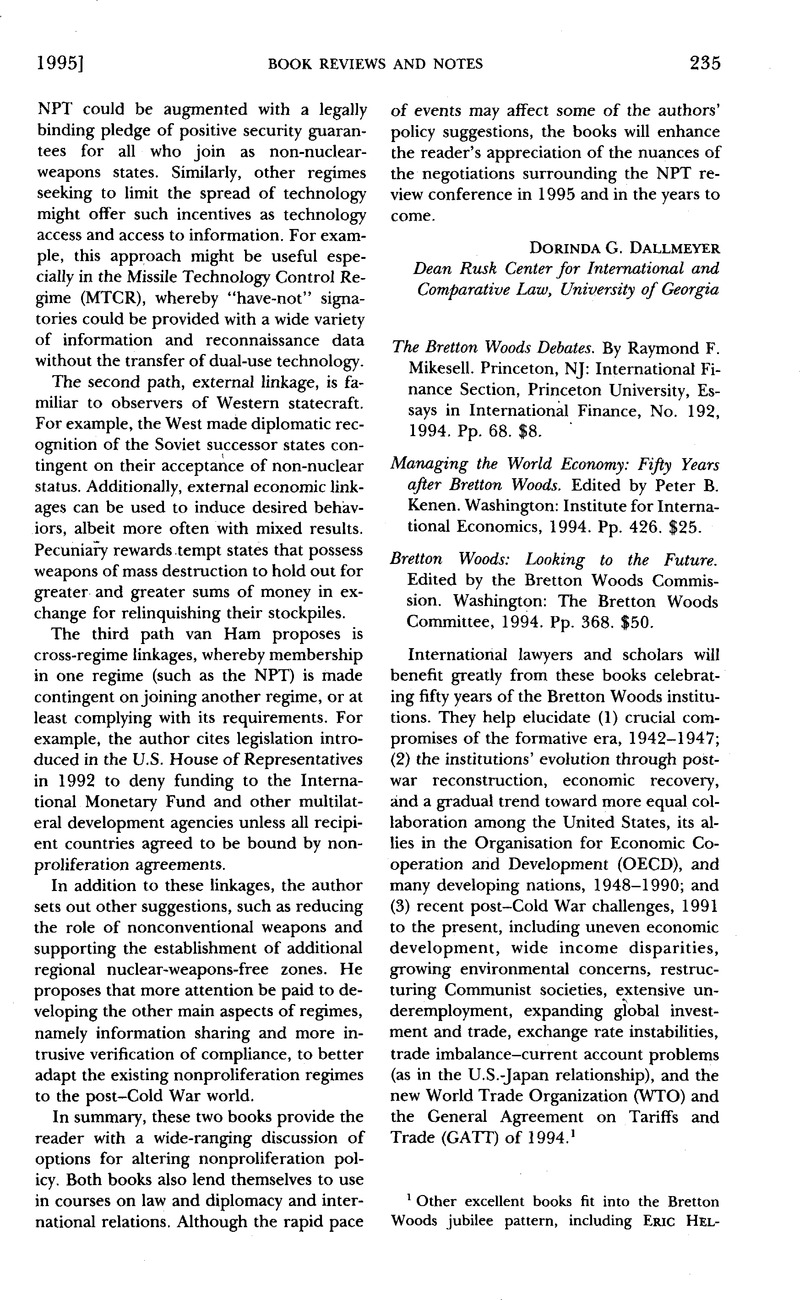No CrossRef data available.
Published online by Cambridge University Press: 27 February 2017

1 Other excellent books fit into the Bretton Woods jubilee pattern, including Eric Helleiner, States and the Reemergence of Global Finance: From Bretton Woods to the 1990’s (1994); A Retrospective on the Bretton Woods System: Lessons for International Monetary Reform (Michael Bordo & Barry Eichengren eds., 1993); Judy Shelton, Money Meltdown: Restoring Order to the Global Currency System (1994); Beyond Bretton Woods: Alternatives to the Global Economic Order. (John Cavanagh et al. eds., 1994); Perpetuating Poverty: The World Bank, The IMF, and the Developing World (Doug Bandow & Ian Vasquez eds., 1994); and Susan George & Fabrizio Sabelli, Faith and Credit: The World Bank’s Secular Empire (1994).
2 Quoted by Rudiger Dornbusch in A Retrospective on the Bretton Woods System, supra note 1, at 99.
3 Each work brings together many prominent experts: 14 authors and 17 commentators for the HE volume, and 33 experts for the Bretton Woods Commission report. Seven were contributors to both projects: C. Fred Bergsten, Barry Eichengren, Peter Kenen, John Jackson, Moises Nairn, Paul Volcker and John Williamson.
4 In this respect, some of the other works cited in supra note 1 offer different perspectives; for example, the Eichengren/Bordo collection is somewhat more conservative and free-market minded; Judy Shelton (the Hoover Institute) is more conservative and pro-gold standard; Bando/Vasquez (the Cato Institute) are free-matket skeptics about soft loans and aid to Third World countries; Cavanagh et al., and George/ Sabelli are more sympathetic to labor interests, developing countries and/or environmental concerns; and Helleiner, a Canadian moderate, is rather detached and focuses mainly on the longer-run evolution.
5 Unfortunately, increased U.S. budget deficits kept upward pressure on U.S. and world-market interest rates and led to an overvalued dollar between 1983 and 1987, and perhaps even later.
6 Although the Clinton administration and Republican leaders pushed the WTO and GATT 1994 deal through Congress in late 1994, there was extensive opposition; populists, working and poorer people, environmentalists and a considerable range of manufacturing and farm interests worried that the new WTO regime (and its dispute settlement process) would disfavor U.S. interests and fail to correct excessive U.S. trade and current-account deficits.
7 Both the Institute for International Economics and the Volcker Commission urge stronger efforts to stabilize exchange rates and coordinate economic policies. This implies more fiscal discipline in many countries (including the United States). But rigid bands or limits on exchange variations do not seem realistic, especially in light of recent disruptions in EC exchange rates and continued serious imbalances in major trade relationships (for example, that between United States and Japan).
8 Dispute settlement is strengthened also by a process that comes close to binding multilateral arbitration.
9 Of course, dedicated multilateralists do not want withdrawal to receive serious consideration. Mutual forbearance will be needed to alleviate serious trade and other economic strains.